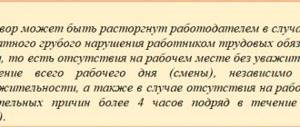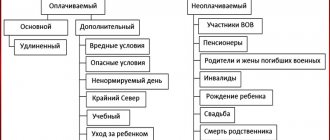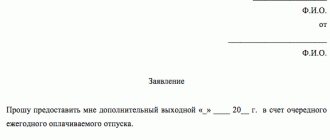Legal leave: what you need to know? May 13, 2011, 00:00 | Katya Kozhevnikova
10 chosen
The closer summer is and the brighter the sun shines, the less desire to work. At this time, another desire clearly manifests itself - to use your right to rest, no less legal and sacred than the right to work. Let's figure out what rights the current legislation gives us in this regard.
It’s worth starting with the fact that mandatory paid leave in our country is 28 calendar days , and not a day less. Moreover, if an employee does not work full-time, this does not affect the duration of his vacation in any way. If part of the legal rest falls on public holidays, such days are not counted. Vacation pay is not accrued for them, but they are also not spent as vacation days. You can split your vacation as much as you like with the consent of the employer, but after Russia ratified the International Labor Organization Convention in 2010, one of the vacations must be at least 14 days . If you want to take your entire month's vacation at once, your employer has no right to prohibit you from doing so. On the other hand, if you want to divide your vacation into several, but your employer is against it, it won’t work out for you either.
What to do if you want to rest more? Firstly, workers under 18 years of age (31 days), disabled people, civil servants, prosecutors, investigators and judges (30 days), teachers and school employees (up to 42 days), doctors of science (48 days) and candidates (36); and healthcare workers (36). Employees of hazardous industries are also provided with additional paid leave. In addition, by agreement with the employer, the employee can take vacation at his own expense.
Remember the old Soviet joke? Boss to subordinate: Do you like warm vodka? I hate it! What about sweaty women? Hate! Great, you’ll go on vacation in February!
Unfortunately, this situation can happen to anyone. When drawing up a vacation schedule, the order of rest for employees is determined by the head of the company together with the trade union. The employee's opinion may be taken into account, but is not required. For example, teachers can rest only in the summer, when schoolchildren do not have lessons. The vacation schedule is drawn up at least two weeks before the start of the year. If there is no schedule, then the employee can go on vacation of his own free will by notifying management in writing 2 weeks in advance.
The first leave for an employee is legally granted six months after the start of work. Although with the consent of the employer it can be provided earlier, with the consent of the employee - and later than this period. In six months, the employee has, as it were, “earned” half of the annual leave, but he can be provided with the entire leave in advance. True, if, after a vacation in advance, an employee decides to quit, he is charged vacation pay, which he has not yet earned. An interesting point: employees who have entered into an employment contract for a period of up to two months are provided with paid leave (or compensation for it) at the rate of two working days for each month of work. The situation is the same for those who are employed in seasonal work.
Those who decide to leave the organization always want to take their entire vacation off first. But you can’t leave immediately after taking a rest; you’ll have to work another two weeks as required by law. It is better to submit an application in advance, according to which all unused vacations will be provided to him (and paid) with subsequent dismissal. The day of dismissal will be considered the last day of vacation. Or you can submit your application two weeks before the end of your vacation so you don’t have to go back to work.
By the way, you should know that you can be called back from vacation only with your consent. No matter what emergency happens at your workplace, no one has the right to return you from vacation to solve problems against your will. If you refuse to return, this cannot be considered a violation of labor discipline.
Now, as for the amount of vacation pay , I personally have never understood where it comes from and how it is calculated. The fact is that vacation pay is your average salary for the last year of work. It is calculated in this way: your annual earnings are divided by 12 (months), and then by another 29.4 (the average monthly number of calendar days). Moreover, earnings take into account not only the rate (the constant part of the salary), but also bonuses, fees and interest on projects. This is how the average daily salary is calculated. It is multiplied by the number of days on vacation, and we get the amount of vacation pay. If a person has worked for less than a year, his average salary is calculated based on the number of days worked.
The employer has no right to pay less than the average salary during vacation. True, if he pays you a “black” salary, he formally has no responsibilities to you at all, but if he pays you a “gray” salary, then vacation pay must be calculated from formal earnings. But both are illegal - you can safely complain to the labor inspectorate about such an employer.
Have your labor rights ever been violated? Tell us about it. Are you going on vacation in the summer? And where to?
Katya Kozhevnikova , iledebeaute.ru
Related materials:
Vacation | preparing for vacation | Law | Work | employee | vacation | legislation | vacation schedule | holiday pay | rights
Articles
- Vacation together and separately May 22, 2013, 00:00
- On vacation with colleagues - what to watch out for February 24, 2014, 00:00
- Vacation: How to manage everything? 07 August 2021, 00:00
Video
- Idylle by Guerlain. History of creation October 25, 2011, 11:03
- Beach makeup. The best cosmetics for relaxation 09 August 2015, 18:00
- The first MONO BOX ILE DE BEAUTE “On vacation with Givenchy”! July 14, 2017, 11:00
How to go on vacation the right way
Summer has come - the holiday season.
Not only a well-chosen travel route will help you get maximum pleasure and a minimum of headaches from your long-awaited vacation, but also being informed about the issue of paid vacations provided by your employer. Specialists from the Research Center of the recruiting portal Superjob.ru are ready to help you figure out how to properly go on vacation.
Who is entitled to vacation?
The right to paid annual leave accrues to an employee who has worked continuously in the organization for 6 months (Article 122 of the Labor Code of the Russian Federation). There are certain categories of employees who are granted leave before the end of six months of continuous work. These are women who want to take leave before going on maternity leave or immediately after leaving it; workers under 18 years of age; employees who adopted a child (children) under the age of 3 months.
When to rest?
In accordance with the Labor Code, the time for granting vacations is regulated by the vacation schedule, which is approved on the basis of an agreement between the workforce and the employer (Article 123 of the Labor Code of the Russian Federation). However, it is not always possible to go on vacation at any time of the year - the employer has the right to refuse to provide you with leave if this is due to production needs. In such cases, you will have to plan your vacation for another, less convenient period for you, or try to convince management. There are categories of employees to whom this rule does not apply: employees under 18 years of age and employees who have adopted a child under the age of 3 months can take leave at any time. In addition, women taking maternity leave can take regular annual leave immediately before or immediately after maternity leave. An employee whose wife is on maternity leave has the right to take leave during the wife’s maternity leave. Husbands and wives of military personnel can go on leave at the same time as their spouses. Part-time employees can take leave from their combined job, which coincides with leave from their main job.
How long to rest?
By agreement between the employee and the employer, annual paid leave can be divided into parts, and at least one of the parts of the leave must be at least 14 calendar days (Article 125 of the Labor Code of the Russian Federation). Non-working holidays that fall during the period of paid leave are not included in the number of calendar days of vacation, and later you have every right to use them together with the other part of the vacation.
Vacations will not expire
Russia's ratification of the International Labor Organization's Paid Holidays Convention in the summer of 2010 caused a lot of controversy and concern. Employees began to fear that their unused vacation days would be lost forever. However, it is not. The international document does not contradict the Labor Code of the Russian Federation in any way and is intended to encourage employers to send staff on vacation in a timely manner so that legal rest days are used on time and as intended. An employing company that does not respect workers' rights to rest may be fined. Remember that the employer does not have the right to leave you without vacation for two years in a row, or to transfer your vacation for the current year without your consent or without good reason, for example, when your absence from the workplace may harm the activities of the organization (Article 124 of the Labor Code). code).
How is vacation pay calculated?
Vacation pay is calculated as follows: the employee’s earnings for the last 12 calendar months of work are summed up, then divided by 12 and 29.4 (the average monthly number of calendar days), and then multiplied by the number of vacation days.
Money - only upon dismissal
Many employees who have accumulated a significant number of vacation days would like to compensate them with money. Unfortunately, this is impossible to do while working. As the Labor Code of the Russian Federation states (Article 126), material compensation for unused vacation is possible only upon dismissal of an employee. However, there are exceptions to this. So, if you officially work irregular working hours and this is stated in the employment contract, then you can receive monetary compensation for the additional days of vacation due under this work schedule (at least 3 days).
Don't skip!
Remember that the law prohibits going on vacation or returning from it later without an appropriately issued order from the employer. Such behavior will be regarded as truancy.
Have a nice holiday!
Why can vacation compensation be less than salary?
Annual paid holidays are provided with preservation of average earnings. The procedure for calculating this indicator is specified in Article 139 of the Labor Code of the Russian Federation. The average daily earnings for vacation pay are calculated by dividing the salary for the 12 months preceding the vacation by 12 and by 29.3 (the average monthly number of calendar days). The amount received will be equal to compensation for one day of vacation. However, it should be remembered that non-working holidays are not included in the number of calendar days of vacation and are not paid.
Employees working under an employment contract receive the same salary regardless of how many days there are in the month. However, the fewer working days there are in a month, the higher the cost of each of them. It is for this reason that it is unprofitable to take a vacation in January.
Question answer
Can an employer force you to take your entire vacation off?
For example, an employee with a salary of 30,000 rubles per month plans to take annual paid leave from January 9 to January 22. In total, taking into account the holidays, he will rest for 22 days, but his monthly income will be reduced by more than 3 thousand rubles.
Let’s make a calculation: let’s say this employee earned 360,000 rubles in a year. Next, we find out his average daily earnings to calculate vacation pay. To do this, divide the total earnings for the billing period by 12 and 29.3. It turns out that the average daily earnings for calculating vacation is 1,024 rubles, and the total compensation for 14 days of rest is 14,336 rubles. It is worth considering that the final amount of vacation pay may be affected by various conditions, including the presence of business trips, time off and previous vacations.
This employee will receive a salary for January based on the number of days actually worked. The cost of one working day in January for this employee will be 1,765 rubles (30,000 / 17 working days in January). He will only work for 7 days. It turns out that his salary for January will be 12,355 rubles, and his total income, including vacation pay, will be 26,691 rubles. It does not matter when the vacation occurs in January: immediately after the holidays or at the end of the month.
If you are an individual entrepreneur, you will not be paid for your vacation
Individual entrepreneurs manage their own time. They can rest for at least most of the year if they have earned it.
Employees who register as an individual entrepreneur and work under contracts with other companies, as if on staff, but as an individual entrepreneur, need to be careful. They are also not entitled to vacation days or paid sick days. In some cases, the employer can pay for the vacation of such people, for example, by making an act on additional provision of services, but this does not always happen.
Select a bank for individual entrepreneurs
Vacation by working days and weekends
Thanks to the possibility of splitting holidays into parts, employees use their holidays differently. The Labor Code of the Russian Federation does not regulate the issue of how an employee’s application for leave should be drawn up - only on working days, on working days and weekends, only on weekends. To understand each case, let's look at all 3 options using examples.
Situation 1. The employee wrote an application for leave for a full week - from June 20 to June 26, 2021. This period includes both weekdays and weekends. If the employer does not mind, then the employee must be given and paid leave for all 7 calendar days. This is perhaps the simplest situation that does not raise any questions.
Situation 2. The employee wrote an application for leave from June 20 to June 24 - 5 calendar days, which according to the calendar are working days. Formally, the employee has the right to do so. And it is impossible to force him to write a statement for the whole week with the “capture” of weekends. Then vacation pay should be paid to him specifically for these 5 days, and June 25 and 26 will be regular days off for the employee.
An employee, having thus divided his second 14 days of vacation, can, in a certain sense, increase his vacation, although only by 4 days (for 2 pairs of days off). But in any case, he will be paid vacation pay only for 28 calendar days during the working year.
Expert opinion
Lebedev Sergey Fedorovich
Practitioner lawyer with 7 years of experience. Specialization: civil law. Extensive experience in defense in court.
Situation 3. The employee wrote an application for leave from June 25 to June 26 - 2 calendar days off. This option is not the most profitable for the employee. However, such a situation is also possible. Then he will need to be provided and paid for 2 days of vacation.
Let us note that if an employee once took such a short weekend leave for some reason, this is unlikely to cause complaints from the inspectors. But inspectors will probably look at permanent holidays on weekends with suspicion.
Conditions for calculating material compensation and assistance
Cash compensation for unused vacation is applied upon dismissal. The Labor Code gives the right to compensation for part of the vacation exceeding the minimum amount of vacation.
When summing up vacations or transferring vacations to another working year, compensation can replace parts of vacation exceeding 28 calendar days. Replacing part of the vacation is not the obligation of the parties to the employment contract, but only an obligation, therefore the employer has the right to refuse.
Upon termination of the employment relationship with the employer, the employee receives compensation for vacation not taken; the amount is equal to vacation pay. You don’t have to take compensation, but then you’ll have to take a vacation first.
A one-time payment when an employee goes on vacation is a fairly popular incentive for employees. One-time payments can be incentive and social. The first is an incentive to take vacation, and the second is aimed at solving any problems of employees.
Incentive payments of up to 4,000 rubles are not taxed, but insurance premiums are charged on them. Over 4,000 rubles, the amount exceeding 4,000 rubles is taxed.
A one-time payment for vacation must be specified in the local regulations of the institution. But the absence of this provision does not make it impossible to provide such assistance. If budget funds are available, the payment has the right to exist. As a general rule, you can receive such help after working in an organization for at least six months.
The amount of payments is also determined by local acts of the institution and the employment contract with a specific employee. As a rule, the amount of payment for budgetary organizations ranges from 1 to 3 salaries. And for state and municipal employees - 2 salaries.
Financial assistance and compensation can be obtained by submitting an appropriate application to the manager.
The latter may, in turn, refuse in the following cases:
- if such a provision is not specified in local acts;
- if after the vacation the employee plans to quit;
- if the employee has not worked for six months;
- if the employee is granted maternity leave.
In other cases, the employer violates labor law standards.
In budgetary institutions, the right to such payments is provided, but in institutions financed from the local budget, the amount depends on the profitability of this budget.
Regulations on assistance to Russian Railways employees in the Russian Federation
In 2021, the management of JSC Russian Railways issued an order based on which employees going on annual leave can receive financial assistance.
The right to this assistance arises for employees who have worked in the directorate for 11 months. The amount of assistance depends on the employee’s salary, as a percentage. The specific size is established by local regulations of the company's branches.
If the vacation is divided into shares, financial assistance is paid in one of the vacation shares, at the request of the employee.
If the employee is subject to disciplinary punishment, the amount of assistance may be reduced, but with the consent of the chairman of the primary trade union organization.
Weekends according to TC
To explain the situation in detail, let’s immediately clarify that weekends and holidays are different categories. According to the Labor Code of the Russian Federation, a day off is considered to be the date that is due to each employee for full-time work. People working a five-day week have guaranteed rest on Saturdays and Sundays. Those who work in shifts also rest for the allotted time, but in a floating mode.
But holidays are established in the Russian Federation by law and can fall on any day of the week; these are the so-called red dates of the calendar. Those people who have a normal work schedule are released from work on holidays, and shift employees receive double pay if their shift falls on this date.
Article 112 of the Labor Code of the Russian Federation lists all calendar dates that are officially established as public holidays. These include:
- New Year holidays and Christmas, which fall on the first eight days of January.
- Day of Defenders of the Motherland February 23.
- Women's holiday March 8th.
- The first of May is considered labor and spring day.
- Victory Day in World War II - May 9.
- Russian State Day – June 12.
- November 4th is National Unity Day.
An organization’s collective agreement may provide for other days off, but they cannot be considered official holidays. Despite the above classification, all these dates are included in the total amount of calendar time. And the vacation period is calculated in calendar days.
How many days of rest can an employee who has worked for six months or more take?
Newly employed citizens should always know how many days of vacation are due after 6 months of work according to the Labor Code. According to Article 115 of the Labor Code of the Russian Federation, in the standard case it is 14 days.
However, there are certain categories of employees for whom the duration of total annual paid leave exceeds 28 days. They may be given a different duration of rest after working for more than six months in a new place.
The final calculation of the duration of vacation can be done in the employer’s human resources department.
Expert opinion
Irina Vasilyeva
Civil law expert
The interested person has the right not to rest immediately after the relevant period has expired. In this case, as the length of service increases, the number of days available for rest increases.
Who is entitled to vacation and when?
Every Russian, regardless of place of work, has the right to 28 days of paid leave once a year. It's called the main one. This right comes after six months of work at the enterprise. Previously, leave could only be obtained by agreement with the employer. In addition, employees of preferential categories have this right, which include:
- teenagers under 18 years of age;
- women going on maternity leave;
- men whose wives are on maternity leave;
- persons who have adopted a child under 3 months;
- honorary donors;
- part-time workers who are starting their vacation at their main place of work;
- spouses of military personnel on leave;
- veterans of the Second World War and other military operations;
- heroes of the Soviet Union, Socialist Labor, holders of state awards determined by law;
- persons exposed to radiation in Chernobyl and other regions;
- other employees whose rights are confirmed by law.
It is worth considering that employers are extremely rarely willing to provide vacation in advance, especially when it comes to recently hired employees. Therefore, when going on vacation in six months or earlier, you need to be prepared for the fact that its duration will be proportional to the time worked. Usually, after six months of work, half of the vacation days allotted per year can be taken off. If vacation was granted for time not yet worked, in the event of dismissal, part of the vacation pay will have to be returned. In case of refusal, the employer can recover the advance paid vacation pay through the court.
Who can go on extraordinary leave according to the law?
According to the law, only certain groups of people can take a vacation before six months of work upon request:
- Minor employees;
- Women expecting a child;
- Parents with two children under 14 years of age;
- Parents of a disabled minor child;
- Specialists who have adopted small children under 3 months;
- Men whose spouses went on maternity leave due to pregnancy and child care;
- Wives whose husbands are serving military service;
- Specialists working part-time – they can receive leave in advance for the same period of time as at their main place of work;
- Veterans of the Great Patriotic War and victims of the Chernobyl accident.
As for pregnant women, by law the employer is obliged to provide her with leave before and after childbirth, at her request. The rest period increases depending on whether the pregnancy is singleton or multiple, whether the birth was difficult or not.











